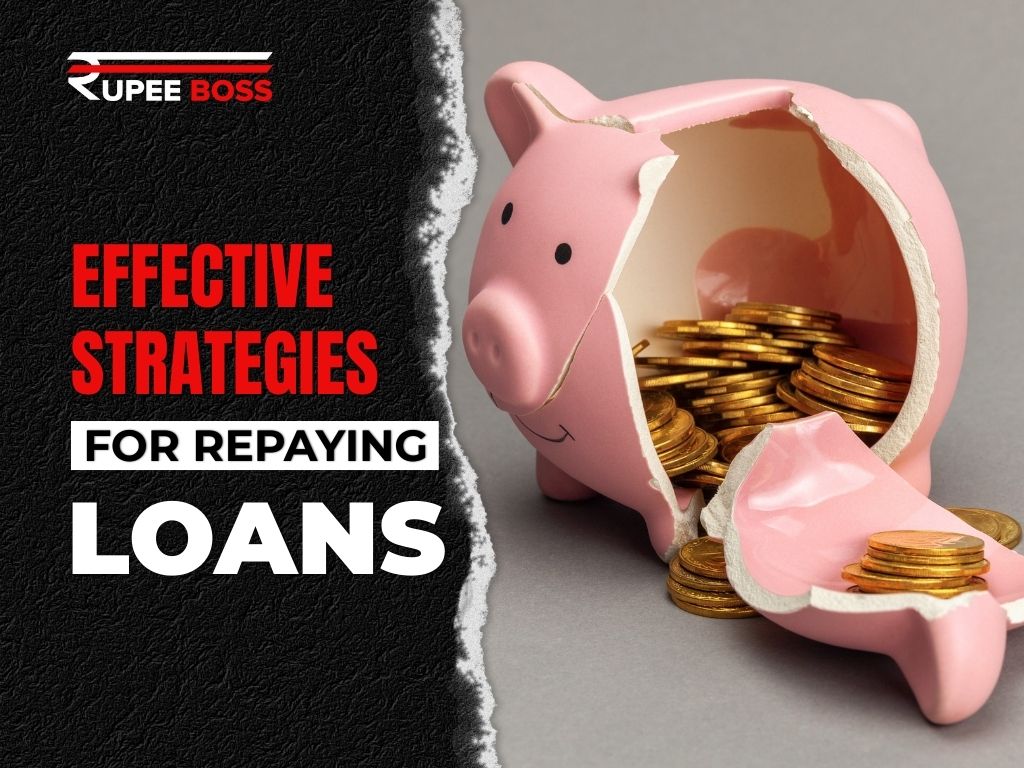
Effective Strategies for Repaying Loans: Take Control of Your Debt
“Debt is not always a bad thing—unless you let it control your future.”
In today’s financial ecosystem, loans have become a key enabler—helping individuals achieve goals like buying a house, funding education, or managing emergencies. But when not handled wisely, they can become a burden that affects your credit score, savings, and peace of mind.
Whether it’s a personal loan, home loan, education loan, or credit card debt, repaying your loan efficiently is essential to maintaining financial health. At RupeeBoss, we help you navigate the repayment journey with clarity, strategy, and control.
In this blog, we outline effective strategies for repaying loans faster and smarter—so you can take charge of your debt and move closer to financial freedom.
Know Your Loan Inside Out
Keyword focus: loan repayment terms, EMI schedule, interest rate
Before you start formulating a repayment strategy, understand your loan details:
Total outstanding principal
Interest rate (fixed or floating)
EMI structure
Repayment tenure
Prepayment or foreclosure charges
Use loan amortization calculators to visualize your interest vs. principal breakdown and track how much you’re really paying over time.
Create a Dedicated Loan Repayment Budget
Keyword focus: budgeting for loan repayment, debt payoff plan
One of the most powerful tools in loan management is a dedicated monthly budget. List all your monthly expenses, EMIs, and income sources. Then:
Allocate a fixed portion of income for EMIs
Prioritize loan repayment over non-essential spending
Avoid adding new debt until existing loans are under control
Use apps or tools to track spending and ensure you don’t miss any payments. Moneycontrol Budgeting Tips
Prioritize High-Interest Loans First (Avalanche Method)
Keyword focus: avalanche method, repay credit card debt, personal loan interest
If you have multiple loans, repay the ones with the highest interest rates first, like:
Credit card dues (often 36–48% p.a.)
Personal loans (typically 10–20% p.a.)
This method, known as the avalanche strategy, minimizes the total interest paid over time and gets you debt-free faster.
Use the Snowball Method for Psychological Wins
Keyword focus: snowball debt strategy, loan repayment motivation
Alternatively, if you need quick motivation, pay off smallest loan balances first (regardless of interest rate). This is called the snowball method.
Helps build repayment momentum
Reduces the number of active EMIs
Keeps you emotionally motivated to continue
Choose the method that works best for your personality and financial situation. Compare CGTMSE Loans
Make Lump Sum Prepayments When Possible
Keyword focus: loan prepayment, how to repay loan early, foreclosure benefits
Every time you get a bonus, tax refund, or incentive, consider making a lump sum prepayment toward your loan. Benefits include:
Reduced outstanding principal
Less interest over the loan tenure
Faster closure of the loan account
Before prepaying, check for prepayment penalties—especially in fixed-rate loans.
Increase EMI Amounts Gradually
Keyword focus: increase EMI, faster loan closure, EMI adjustment
If your income has increased, don’t keep paying the same EMI.
Increase your EMI by even 10–15%
Reduces tenure significantly
Saves lakhs in interest
Many lenders allow you to revise your EMI online or via request—check with your bank or financial advisor.
Consider Loan Refinancing or Balance Transfer
Keyword focus: loan refinancing India, balance transfer, reduce EMI
If you’re locked into a high-interest loan, you can transfer your balance to another lender offering lower interest rates or better terms.
Particularly useful for home loans and personal loans
Can reduce EMI or shorten tenure
Check for processing fees, new loan terms, and documentation requirements
RupeeBoss Loan Comparison can help you compare top refinancing offers and facilitate a smooth transfer.
Avoid Minimum Payments on Credit Cards
Keyword focus: credit card debt India, paying minimum amount
Paying only the minimum amount due on your credit card keeps you in the debt trap for years. Always aim to:
Pay the full due amount
Convert large transactions to EMIs if needed
Avoid cash withdrawals and revolving credit
If credit card debt is piling up, consider a Credit Card Debt Management Guide at a lower rate.
Stay Financially Disciplined
Keyword focus: financial discipline, avoid loan default, debt management tips
A strategic approach won’t work unless backed by discipline:
Set reminders for EMI dates
Avoid impulse purchases
Maintain a strong emergency fund to avoid fresh borrowing
Monitor your credit score regularly for any issues
Talk to Your Lender in Times of Difficulty
Keyword focus: loan restructuring, defer EMIs, financial hardship solutions
If you’re facing temporary cash flow issues (job loss, medical emergency), communicate with your lender before missing payments.
Request for EMI moratorium, tenure extension, or restructuring
Avoid loan defaults which hurt your credit history and CIBIL score
Lenders are more accommodating than you think—transparency helps
Final Thoughts: Take Charge of Your Loan, One Step at a Time
Repaying a loan doesn’t have to feel overwhelming. With the right strategy, consistent planning, and smart financial decisions, you can reduce your debt faster and improve your financial confidence.
At RupeeBoss, we’re here to help you make informed choices—whether it’s selecting the right loan, planning repayments, or improving your credit profile. Our experts and tools are designed to support your journey to a debt-free, financially secure future.
